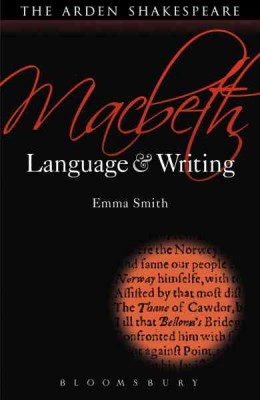| Macbeth: Language and Writing Contributor(s): Smith, Emma (Author) |
|
 |
ISBN: 1408152908 ISBN-13: 9781408152904 Publisher: Bloomsbury Publishing PLC OUR PRICE: $26.68 Product Type: Paperback - Other Formats Published: July 2013 |
| Additional Information |
| BISAC Categories: - Literary Criticism | Shakespeare - Drama | Shakespeare |
| Dewey: 822.33 |
| Series: Arden Student Skills: Language and Writing |
| Physical Information: 0.4" H x 5.1" W x 7.7" (0.45 lbs) 192 pages |
| Descriptions, Reviews, Etc. |
| Publisher Description: Arden Student Guides: Language and Writing offer a new type of study aid which combines lively critical insight with practical guidance on the critical writing skills you need to develop in order to engage fully with Shakespeare's texts. The books' core focus is on language: both understanding and enjoying Shakespeare's complex dramatic language, and expanding your own critical vocabulary, as you respond to his plays. Key features include: an introduction considering when and how the play was written, addressing the language with which Shakespeare created his work, as well as the generic, literary and theatrical conventions at his disposal detailed examination and analysis of the individual text, focusing on its literary, technical and historical intricacies discussion of performance history and the critical reception of the work a 'Writing matters' section in every chapter, clearly linking the analysis of Shakespeare's language to your own writing strategies in coursework and examinations. Written by world-class academics with both scholarly insight and outstanding teaching skills, each guide will empower you to read and write about Shakespeare with increased confidence and enthusiasm. At a climactic point in the play, Macbeth realises that the witches have deceived him through their ambiguous language: 'they palter with us in a double sense'. This book explores Shakespeare's own paltering in the play - the densely rich language of ambition, of blood, and of guilt that structures Macbeth. |
Contributor Bio(s): Smith, Emma: - Emma Smith is Fellow in English at Hertford College, Oxford, where she teaches Shakespeare and early modern literature to undergraduates and graduates. Her work is mainly on Shakespeare and Renaissance dramatists.Callaghan, Dympna: - Dympna Callaghan is Dean's Professor in the Humanities at Syracuse University and works on early modern English Literature. She has held fellowships at the Newberry, Folger, and Huntington Libraries, has been a British Academy Visiting Professor and is a Life Member of Clare Hall, Cambridge University. She is an active member of the interdisciplinary Syracuse University Medieval-Renaissance group of faculty and graduate students. Her books include editions of Shakespeare's The Duchess of Malfi, The Taming of the Shrew and Shakespeare's Sonnets, as well as Shakespeare Without Women, Woman and Gender in Renaissance Tragedy, and Impact of Feminism in English Renaissance Studies. |